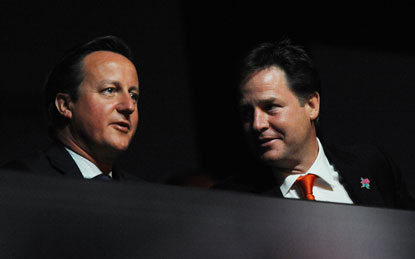Prime Minister David Cameron today backed proposals to introduce a cap on adult social care costs as part of the coalition government’s mid-term review.
 Cameron and Deputy Prime Minister Nick Clegg also outlined proposals to cut the cost of childcare and boost house building after ‘taking stock’ of progress made in implementing the original coalition agreement.
Cameron and Deputy Prime Minister Nick Clegg also outlined proposals to cut the cost of childcare and boost house building after ‘taking stock’ of progress made in implementing the original coalition agreement.As part of moves to provide ‘dignity in old age’, the review stated that the government supports proposals for a cap on costs. Clegg added the government ‘will act to make social care more affordable’ before the election in May 2015.
A cap was one of the main recommendations of the Commission on Funding of Care and Support, chaired by economist Andrew Dilnot, which reported in July 2011.
Ministers have already said they back the principles underpinning the commission’s proposals, but have not yet committed to putting them into law.
Dilnot recommended that no one should be required to spend more than £35,000 of their personal assets on care in their old age. However, it is expected the cap will be set higher. Last week, former care services minister Paul Burstow urged the government to set it at £50,000–£60,000, in 2015 prices.
Cameron and Clegg also confirmed plans for a single-tier state pension, which will merge the basic pension with the second state pension.
The Mid-term review stated that the coalition would work ‘towards a better, simple, single basic pension’ as well as ‘protecting pensioners against falls in the value of their pensions’ through a ‘triple lock guarantee’ for the duration of this Parliament.Commenting ahead of the review, Cameron and Clegg said the reforms to public services would build ‘on those already under way to secure our country’s future and help people realise their ambitions’.
They added: ‘We are dealing with the deficit, rebuilding the economy, reforming welfare and education and supporting hard-working families through tough times.
‘And on all of these key aims, our parties, after 32 months of coalition, remain steadfast and united. Of course there have been some issues on which we have not seen eye to eye, and no doubt there will be more. That is the nature of coalition. But on the things that matter most – the big structural reforms needed to secure our country’s long-term future – our resolve and sense of shared purpose have, if anything, grown over time.’
Peter Riddell, director of the Institute for Government, welcomed the decision to review the coalition agreement.
He said: ‘The Programme for Government was initially the central reference point driving activity across government. Over time, however, its importance has waned, partly because of changes and cutbacks resulting from the autumn 2010 Spending Review and also because of the continuing pressures produced by the sluggish economy.
‘Moreover, the original agreement contained many ambiguities which have produced friction within, and between, the coalition partners. The mid-term review should be clearer than the original programme about priorities and include an action plan and timeline for implementing remaining and new pledges. Implementation of important reforms already enacted by Parliament will take up a significant proportion of the coalition’s energies over the next two-and-a-quarter years but the government recognises the need for action on other areas such as banking reform, adult social care, child care and pensions, as well as stimulating economic growth.’





















